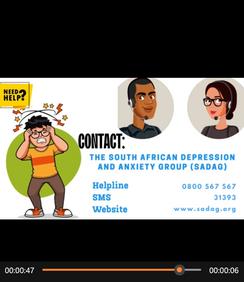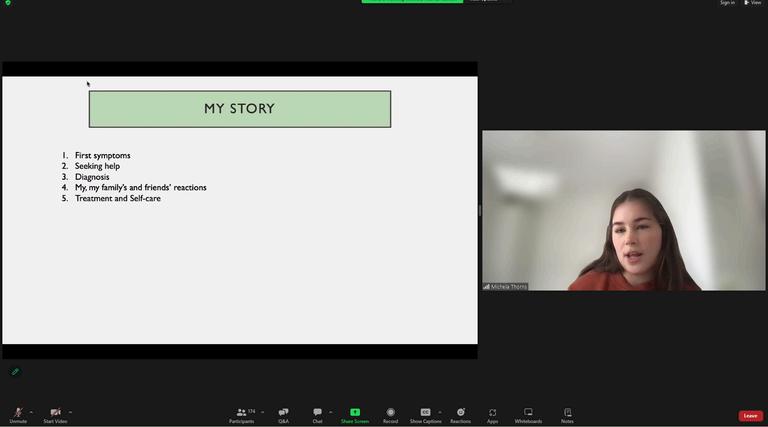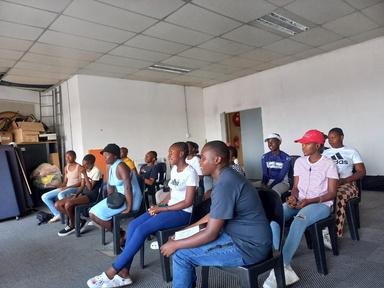YOUTH FORUM


2024-2025 forum OVERVIEW
INTRODUCTION
The forum aimed to empoweryoungmentalhealthadvocates to guide national mental health advocacy and awareness efforts, while enhancing their voices, advocacy skills, capacity, and mental health knowledge.
Eight members (aged 18-24 years) from the previous pilot forum chose to continue as alumni and were further supported to continue their ongoing advocacy in the form of practical work outputs.
Fifteen new youth mental health advocates (aged 18-24 years) from the North West and Kwa-Zulu Natal (KZN) provinces were selected to participate in a six-month virtual advocacy programme. They formed Cohort Two.
The forum’s approach combined advocacy training, professional insights, self-directed learning, and practical awareness campaigns.

Motivation
Buildingonthesuccessofour2023/2024pilotforum,theSouth AfricanFederationforMentalHealth(SAFMH)expandedthe forumtoincludetwoadditionalprovinces,whilecontinuingto supporttheoriginalcohort.Withyouthstillunderrepresentedin SouthAfrica’smentalhealthpolicyspaces,theforumremainsa vitalplatformforadvocacyandempowerment.
THIS EVALUATION REPORT
The purpose of this evaluation is twofold:
Obtain learnings that can inform the implementation of future iterations of the forum. Understand how participating in the forum impacted on members.
Evaluation Framework
Three key questions guided the evaluation:
How was the forum implemented? What was the experience of participants in the forum? In what ways did the forum impact participants?
Key Question
Relevant Data
Reports of programme components as per workplan developed in the pilot year
How was the forum implemented?
What was the experience and benefits of members in the forum?
Attendance and reasons for nonattendance
Adaptations made to programme, especially the alumni programme
Participant feedback (on meeting content and structure)
Participant feedback on how the forum could be improved
Method/Source
Participant sharing on what being a part of this forum has meant to them
When collected
Notes from weekly review meetings Weekly
Attendance Sheets Weekly
Notes from weekly review meetings Weekly
Anonymous online surveys Every meeting
Anonymous online surveys and inperson group discussions
Anonymous online surveys and group discussions
December 2024 & March 2025
December 2024 & March 2025
PROGRAMME AT A GLANCE
We continued working with the 2023/2024 cohort (Alumni) and recruited a new forum members (Cohort Two). Each group followed a separate programme.
Alumni
June2024-March2025
10monthvirtualprogramme
Opentoforummembersfrom 2023/2024cohort(aged18-24)
9forummembersoptedto continueasalumni
8-10-hourspermonth
Youth-ledinitiative 5modesoflearning
Alumni aim: Develop work outputs and engage in advocacy opportunities to actively pratice mental health advocacy.
Cohort Two
September2024-March2025
6monthvirtualprogramme
Opentoyoungpeopleaged 18-24fromNorthenCapeor KZN
15candidatesselected 8-10-hourspermonth
Youth-ledinitiative 5modesoflearning
Cohort Two aim: Enhance mental health knowledge, advocacy, policy reading and awareness raising skills for future advocacy work.




ABOUT OUR FORUM MEMBERS
Alumni Demographics: Nine 2023/2024 forum members signed agreements to continue their work as alumni Alumni were from Gauteng and Western Cape and had diverse backgrounds in accounting, radio, law, education, engineering, and psychology. The mean age was 23. Three members disclosed having a mental health condition, and five of the nine were female.
Cohort Two Demographics: Fifteen incoming forum members were selected from 99 applicants Members were from North West and KZN and had diverse backgrounds in social work, art, education, law, and psychology. The mean age was 22.5. Three members disclosed having a mental health condition, and eleven of the fifteen were female.

From June 2024 to March 2025, there were 7 online meetings and one three-day in-person meeting. Each online meeting lasted 1.5 hours. Overall meeting attendance was 81%. Barriers to attendance includedpersonalorfamilyemergencies,illness,exams,andwork.
Cohort Two Meeting Attendance
From September 2024 to March 2025, there was a full-day online introductorymeeting,23onlineweeklymeetings,andonethree-day in-person meeting. Each of the online weekly meetings lasted 1.5 hours. Overall meeting attendance was 92%. Barriers to attendance includedpersonalorfamilyemergencies,exams,andwork.
OVERALL FORUM IMPLEMENTATION
The feedback from the pilot cohort informed the implementation of the second iteration of the forum as well the alumni programme.
The forum continued to be deemed feasible and acceptable by both Alumni and Cohort Two.
Feasibility was assessed through attendance, retention, participation, and completion of take-home tasks o work outputs.
Acceptability was assessed through behavior (retention), affect (feeling), and cognition (perception) of the forum, as informed by anonymous online surveys.
For Alumni: An 88% retention rate w achieved, with 8 out of 9 members completing the forum. One member left due to permanent employment and becoming a parent.
For Cohort Two: A 93% retention rate was achieved, with 14 out of 15 members completing the forum. On member left after securing permane employment in 2025.

2024-2025 alumni INSIGHTS
ALUMNI MODES OF LEARNING

Virtual Meetings
Work Packages
Individual feedback
Awareness campaigns
Peerlearning andsupport
Monthlyonline,unstructured90-minutemeetings to discuss and troubleshoot alumni’s practical advocacy work, identify opportunities for advocacy within the mental health field and develop work outputs.
Each alumnus developed between 2and6work packages, which strengthened the advocacy skills of the alumni and could be used to assist SAFMH and its partners in furthering national advocacy work.
Individual feedback on work packages was provided by SAFMH programmes staff to help members developandstrengthentheirskills, enhancing their mental health advocacy and awareness journeys.
Alumni had the option to receive R1,000seedfunding to run physical, virtual, or hybrid mental health awareness campaigns, either to amplify their work packages or address a need in their communities.
Internal peer support was provided by and to forum alumni, mainly to offerstrategicguidanceandmoral support in the development of their work outputs.
WORK PACKAGES
Nine alumni developed 29targetedadvocacyworkpackages, which included research reports, policy briefs, public service announcements, digital content, blogs, key ask documents, letters, presentations, and infographics. Each package was alignedwithnationalpolicies and selected by the member based on their interests. These packages aimed to enhance the alumni’s advocacy capacity while supporting SAFMH’s national advocacy efforts. Three work packages are highlighted below.
Onthatile advocated for increased diverse youth participation through a research report, policy brief and blog.








Marvin advocated for increased psychosocial support in schools through a key ask document, letter and video.


Senzo advocated for methadone as a response to opioid addiction through an infographic, presentation, and research report.


OPPORTUNITIES
Alumni forum members participated in six high-level meetings and consultations across four government departments, presented at two speaking opportunities with 200+ attendees, and provided guidance on two national public mental health awareness initiatives to ensure they were youth-friendly. Specific examples include:
Michela spoke to 180 Deloitte employees about how workplaces can accommodate people with mental health conditions.




Lesego and Owam reviewed the mental health content for UNICEF South Africa’s online course on youth advocacy for nutrition and mental health.



Nhlalala participated in a workshop hosted by the United Nations High Commissioner for Human Rights on disability inclusion in climate change responses.

ALUMNI SPOTLIGHT: ONTHATILE

Theforumhas givenmea platformtoshare mylived experiencesand growintoamore confidentand informed advocate.
Beinganalumnihasbeenadeeply meaningfulpartofmypersonaland professionaljourneyasamental healthadvocate.Theforumhas givenmeaplatformtosharemy livedexperiencesandgrowintoa moreconfidentandinformed advocate.Remainingactively involvedintheforumhasallowed metocontinuebuildingmy knowledgeandadvocacyskills, whiledeepeningrelationshipswith colleagueswhosharemypassion. Throughongoingparticipation,I havelearntabouttheimportance ofprioritisingyouthmentalhealth inSouthAfrica.I'vegainedricher understandingofhowmental healthchallengesuniquelyaffect youngpeople.Thesenseof communityandsharedpurposein theforumcontinuestoinspireme.
Lookingahead,Ihopetokeep workingonyouth-centredmental healthadvocacyandcontributeto buildingsystemsthatare accessible,inclusive,and responsivetoyoungpeople’sreal needs.Whetherthroughresearch, storytelling,orcampaigns,I’m committedtoensuringyouthvoices areheardandhelpshapethefuture ofmentalhealthinourcountry.
ALUMNI SPOTLIGHT: ABIGAIL

Itwasmyfirst timedoing research,andit gavemeastrong senseofbelonging andpurpose—Ifelt likeIwasdoing somethingtruly meaningful.
MynameisAbigailMeadza,andI’m passionateaboutadvocatingfor mentalhealthandwellbeing.My journeyasamentalhealth advocatehassharpenedmy perceptionanddeepenedmy knowledge—mentalhealthisan areawhereyouneverstoplearning.
Somehighlightsofbeinganalumni wasworkingonaresearchreport aboutmen’smentalhealthand creatingakeyaskdocumenton integratingperson-centredcare intomentalhealthservicesin townships.Itwasmyfirsttime doingresearch,anditgavemea strongsenseofbelongingand purpose—IfeltlikeIwasdoing somethingtrulymeaningful.
Thisexperiencehadabigimpact onmyadvocacywork,andInow seemyselfcontinuinginthisspace foralongtime.Oneofthemain reasonsI’vestayedinvolvedinthe forumasanalumnaistokeep growingmyknowledge there’sstill somuchtolearn—andbecauseof theincrediblesupportI’vereceived fromSAFMH.
2024-2025 cohort two INSIGHTS
COHORT TWO MODES OF LEARNING
Educational meetings
Thematic groups
Charing sessions

Awareness campaigns
Peerlearning andsupport
Weeklyonline90-minutemeetings on developing knowledge and insights for mental health advocacy and awareness in South Africa. The meetings featured guest speakers, practical workshops and discussions.
Thematic small groups provided a space for focused groupwork, allowing forum members to concentrate on specific areas of interest. In these groups, members developed advocacy tools (e.g. a Key Asks document).
Forum members each had a chance to chairthe weeklysessions, which helped built leadership and communication skills, boost confidence and encourage active engagement of fellow members.
Forum members received R1,000seedfunding to run physical, virtual or hybrid mental health awareness campaigns in their communities in February and March 2025 based on a topic of their choice.
Peer support for forum members to provide each other with strategicandmoralsupport, especially in the development of mental health awareness campaigns.
EXPERIENCE OF THE MEETINGS
The topics for each online meeting are outlined below. Item 4 includes two online social meets (10 Dec 2024 and 14 Jan 2025). Item 5.5, 'Awareness campaign check-ins,' includes three online sessions (18 and 25 Feb, and 4 Mar 2025).
1.1
Getting to know each other, forum logistics, mental health
Mental health advocacy, your mental health as an advocate
I loved how interactive it was. There was a space for eveyone to speak.
I learned about the importance of not neglecting my own mental health Prioritising my mental health is just as important as helping others.
I learned how to engage with policy and participate in the formation of policies
I really liked hearing about the ins and outs about advocacy and the experience the speaker has had from working in advocacy - I was very inspired
I learned just how all the mental health systems are so interconnected. Each one of us all has different roles to play and contribute. Yes we still have a long way to go in our country, however I'm very hopeful 2.2
It spoke about the current issues in our mental health system and gave us suggestions on how we can go about addressing them
The chair handles the sessions well and is always engaging and listening to others.
I loved the team work in the breakout rooms and listening to the presentations of both thematic groups. It was truly insightful!
EXPERIENCE OF THE MEETINGS
Creative ways to convey information
Digital & traditional media for advocacy
I liked the idea of talking about mental health through storytelling - very indirect and subtle way yet powerful if done correctly.
Learning about how we as advocates can reach out to journalists 3.3 Content development
I loved this session because content creation is something that I have been doing for a while now, so hearing how to improve was helpful. 3.4 Presenting your content development
I loved hearing everyone ' s ideas and thoughts Expsoure to different opinions has really helped expand my mind.
5.1 Recap: Sept - Dec 2024
Recapping everything we ' ve done has made me realise how much I have learned so far.
I was absolutely inspired by the great work of all of the speakers today! I had so many ideas of how I can make an impact in the mental health field just as they are doing.
Going over the whole campaign made me feel at ease with my campaign
I liked that an alumni came to share her experiences with us and answered our questions about the campaign
I love how we each share our progress and get to learn from fellow members some of the ways they are planning their campaign
I learned about how to approach campaigns and how to celebrate yourself after you have completed the campaign.
EXPERIENCE OF THE MEETINGS
Cohort Two rated all the online meetings highly. Members found that the speakers interacted and listened to them (average rating 4.85/5), found the content important (average rating 4.7/5) and considered the content helpful (4.82/5).
Level of interaction with session speakers
Session Number

The speakers interacted with me
Importance
of session content

What we did and talked about was important to me
Helpfulness of sessions

I found what we did today helpful
AWARENESS CAMPAIGNS
Forum members organised campaigns to raise awareness about mental health issues in their community. Topics included: neurodevelopment awareness, mental health at university, and stigma reduction. Members conducted inperson events (4), digital (10) and hubrid (1). The images below capture moments from the awareness campaigns. After the campaigns, members compiled impact statements through a reflection exercise.
I created a space for students to learn about mental health. 13 students (65% of the total residence's students) attended the wellness workshop, and rated it 4.8/5 for helpfulness. There was high engagement online with TikTok posts gaining 864 views and 813 views on Facebook. Because of this campaign, weekly social events at the residence were implemented to provide support and spread positivity.








SPOTLIGHT: NOMBULELO

Forthefirsttime, Ifeltlikemy voicemattered. Today,Ispeak aboutmental healthwith conviction. Istandtaller, knowingthatmy storyholds power.
BeforejoiningtheSAFMHYouth Forum,Iwasstrugglingsilentlywith chronicmigraines,depression, anxiety,lowself-esteemandlacked theconfidencetospeakup,evenin safespaces.Iwasseeinga psychologisttwiceamonthandwas heavilymedicated.WhenIjoinedthe forum,Iwassimplyhopingtostep outofmycomfortzone,meetnew people,andlearnsomethingnew. WhatIfound,however,was somethingfargreater:Ifoundmyself!
Theforumbecameaspaceformy transformation.Ilearnedhowto expressmyselfandadvocatefor mentalhealth.Iwasintroducedto mentalhealthpolicies,which sparkedanewpassionwithinme.For thefirsttime,Ifeltlikemyvoice mattered.
Today,Ispeakaboutmentalhealth withconviction.Istandtaller, knowingthatImystoryholdspower andIamnotalone.Theforumgave memorethanknowledge,itgaveme community,courage,andclarity.AsI continuemyjourneyasastudent socialworker,Icarrytheselessons withme,determinedtomakea differenceinthelivesofothers,just astheYouthForumhasmadein mine.THISWASAJOURNEYOF HEALINGANDGROWTH!
SPOTLIGHT: LERATO

Ahighlightof myexperience hasbeen connectingwith like-minded individualswho sharethesame passionfor mentalhealth advocacy.
IjoinedtheSAFMHYouthForumto helpbringmentalhealthstigmasto lightandcontributetoasociety wherepeoplecanunlearn misconceptionsandbettersupport thoselivingwithmentalhealth challenges.Iwas23atthetime,and duringmyfirstin-personmeetingat theSAFMHoffices,Icelebratedmy 24thbirthday amomentthatfelt symbolicofthenewchapterIwas embarkingon.
Livingwithmentalhealthissues myself,I’veoftenfaced misunderstandings.Throughmy journeywithSAFMH,I’velearnedthat mentalhealthissuesareconsidered invisibledisabilities,astheycanlimit one ’sabilitytoengageincertain activities.Thisrealisationhasbeen empoweringandhasstrengthened mycommitmenttoadvocacy.
Ahighlightofmyexperiencehas beenconnectingwithlike-minded individualswhosharethesame passionformentalhealthadvocacy. Theseinteractionshaveshownme theimportanceofempathy,patience, andeducationinbreakingdown stigma.Lookingahead,Ihopetokeep raisingawarenessandhelpcreate inclusivespaceswhereindividuals withmentalhealthchallengesfeel understoodandsupported.
2024-2025 forum IMPACT
OVERALL EXPERIENCE
Overall forum members described the forum as an inspiring, educational, safe, empowering, and nourishing space that pratically supported members and facilitated their growth as youth mental health advocates.
“I feel grateful and empowered. Being around my colleagues has fueled and inspired me. The work that they do in their communtiies is impactful and life-changing.
“I liked the unity we had together. It actually dawned on me that in all organisations that I've spent time with and participated in, this is the first time I felt safe and belong.”
“I'm thankful for the experience, the people, the environment and the knowledge I gained. I have a renewed sense of purpose. I feel energised to continue with the cause and focus more on my advocacy journey because of the knowledge I've gained and the understanding I have now ”

“I am thankful to SAFMH for giving me a platform to use my voice and be heard.”



ECONOMIC IMPACT
96% of all members sta receiving R50 airtime pe attended helped them f
98% of all members sta receiving R100 per onlin attended helped them f
100% of all members st a part of the forum had employability skills.
I can mention that I was part of a forum, I have skills and experience of planning and hosting a campaign, I can communicate with people. I can set a budget. I can monitor and evaluate impact.
I know how to read and analyse policies and interact with other team members. That has developed my leadership skills, my confidence and my ability to be a team player.

Being part of the forum has helped improve my advocacy skills and as a result, it has made it easier for me to get opportunities in the mental health space.
MENTAL HEALTH IMPACT
When asked: “Howhastheforum improvedyourmentalhealth?”, forum members shared:
“Super fulfilling as I was engaging in activities that speak to my passions and was surroundedbyalikemindedand healthycommunity!”
“It’s builtmyconfidence and love for advocacy.”
“The support made me feelsafetolearn and make mistakes.”
“I've learnt to be more awareofmyown needs, to care for my mental well-being, and be my own biggest advocate too.”
“I have been able to discovermore aboutmyself and learn how to deal with my own mental health.”
“It has boostmyselfesteem knowing that I am part of this great group.”

OUR IN PERSON MEET
In March 2025, all forum members met in person for three days to reflect on the forum, plan its next phase, and visit a community-based mental health organisation. Members evaluated the meet anonymously and key themes are noted below.
What worked well
To be improved

RECOMMENDATIONS FOR THE FORUM'S FUTURE
Development opportunities
Encourage Integration
Increased learning
Expandwork outputs
Useofwork outputs

To retain forum members, there should be more exposuretonetworkingandprofessionalgrowth opportunities. Guest speakers and networking events should feature more prominently.
There should be plannedgroupactivities to facilitate more integration between the Alumni and Cohort Two, such as members scross cohorts partnering together to produce a work package.
A revisedhandbook,guestspeakers,andbooster advocacyskillssessions were suggested as important ways to supplement the practical learnings of the alumni programme.
In addition to the current work outputs, developing workshopmaterials and providingconsultation feedback were also suggested as ways in which forum members could do advocacy work.
Work outputs should be accessibletothepublic through SAFMH's website and digital platforms. They should feed directly into SAFMH's overall advocacy strategy and awareness campaigns.
THANK YOU


